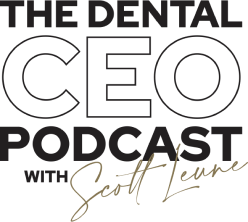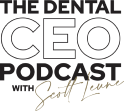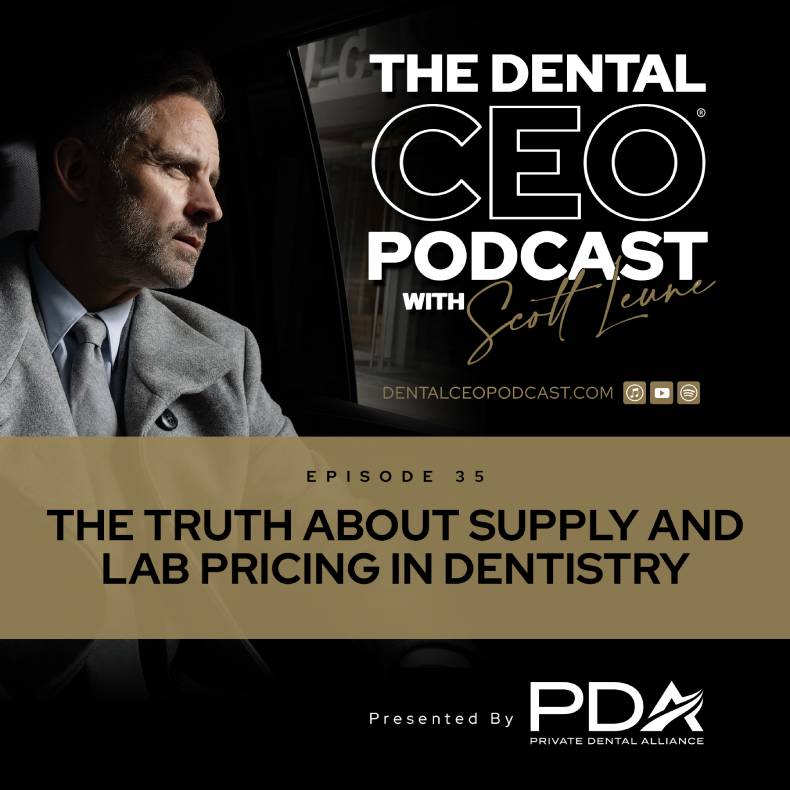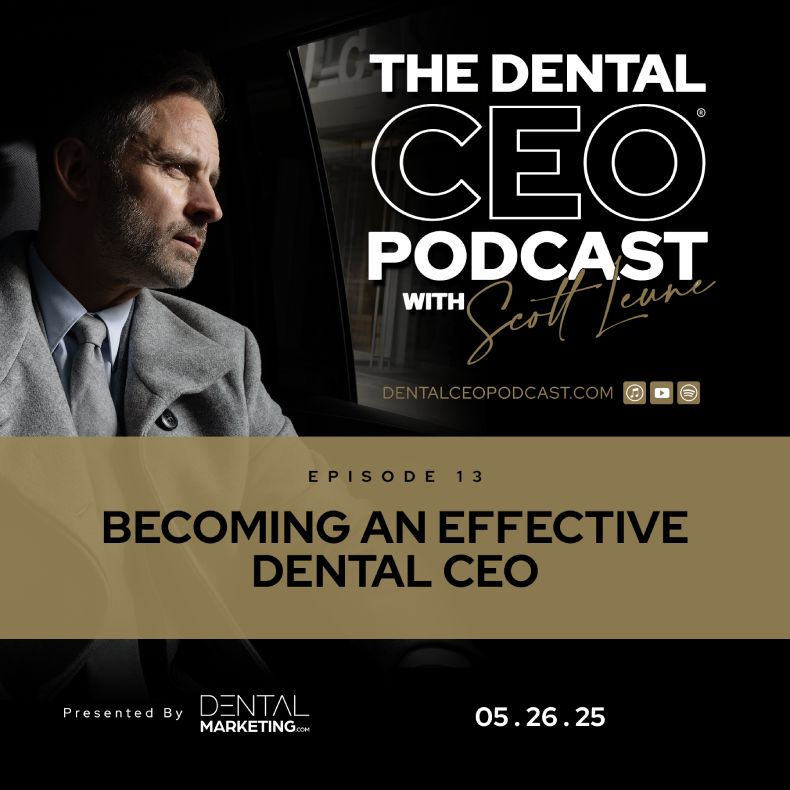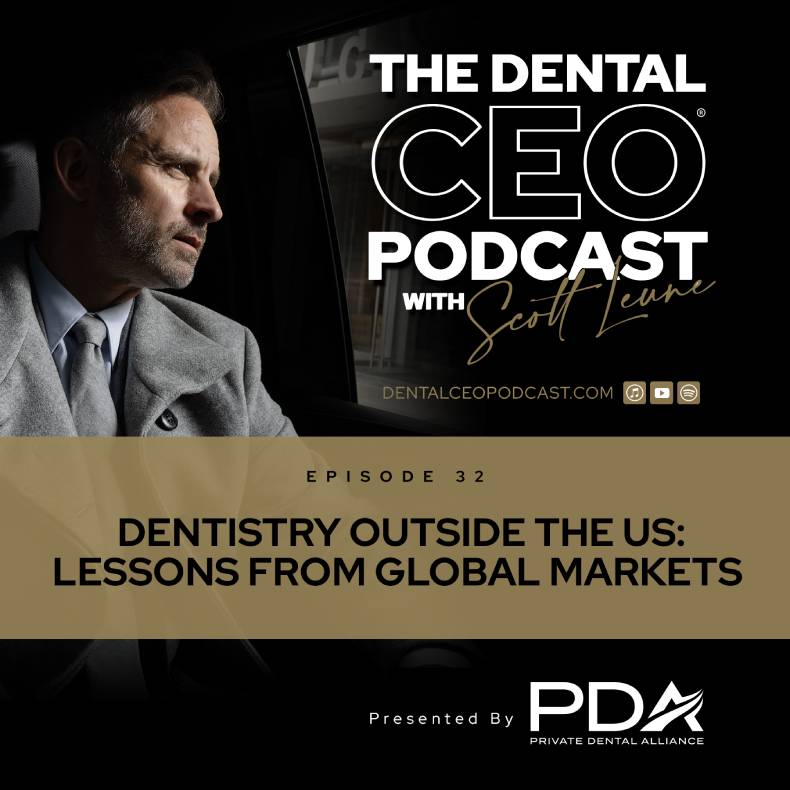Dental CEO Podcast #13 – Becoming an Effective Dental CEO
In this episode of the Dental CEO Podcast, Scott dives into the art of productivity and accountability for dental professionals. Are you overwhelmed by the daily grind of running a practice? Discover how to transform your workday with simple yet powerful strategies that can dramatically increase your efficiency and peace of mind. Learn how to effectively delegate tasks, perform essential audits, and manage your to-do list like a pro. Whether you’re struggling with accountability or looking to optimize your non-clinical tasks, this episode offers actionable insights to help you become a more effective leader.
Highlights
- Productivity vs. Busyness- differentiate between being productive and merely busy, emphasizing the importance of focusing on essential tasks rather than getting caught up in less important activities.
- To-Do List Strategy- A detailed explanation of using a to-do list to enhance productivity, including categorizing tasks into those that can be delegated, those that are quick to complete, and those that require more time and focus.
- Delegation and Accountability- The importance of delegating tasks effectively and holding team members accountable for their completion, with a daily follow-up routine to ensure tasks are done.
- CEO Time and Audits- The concept of setting aside specific times during the day for non-clinical tasks and performing audits to ensure the practice is running smoothly.
- Work-Life Balance – Strategies for maintaining a balance between work responsibilities and personal life, including shutting off work-related tasks at the end of the day to focus on family and personal time.
- Handling Task Overload- Advice on managing periods of increased workload, including temporarily increasing work hours or making permanent changes to reduce stress, such as hiring additional help or cutting unnecessary tasks.
- Role of a Personal Assistant- The potential benefits of hiring a personal assistant to handle both work and personal tasks, freeing up time for more important activities.
- Building a Culture of Accountability- Encouraging a practice environment where accountability and productivity are prioritized, leading to a more efficient and stress-free work atmosphere.
Speakers
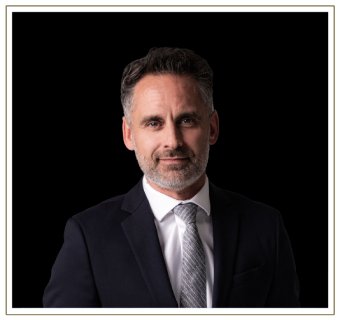
Dr. Scott Leune
Scott Leune, known as The Dental CEO, is one of the most respected voices in dental practice management. From his seminar room alone, he has helped launch over 2,000 dental startups and supported more than 20,000 dentists across practices worldwide. Named one of the 30 Most Influential People in Dentistry, Leune delivers practical, no-fluff strategies that empower dentists to lead with confidence, scale efficiently, and achieve real personal and financial success.
Watch Episode
Read Full Transcript
Scott Leune: This podcast is sponsored by dentalmarketing.com and they have agreed to give the listeners of this podcast a free competitive marketing analysis. This analysis is going to show you very clearly how your practice is doing compared to your competitors. It's going to give you the health of your SEO, it's going to give you a website grade, and you'll also see what your competitors are up to. This helps you know what ad strategy you should have today, how clean and effective is your marketing right now find out by getting this free and detailed analysis, text the word marketing to 4 8 6 5 9, and you'll receive this competitive analysis from our sponsor dentalmarketing.com. I'm not sure if you have this struggle, but you might. Do you struggle with accountability? Do you struggle with being effective as a CEO? Do you struggle with getting the important things done ahead of just the loud or the busy things? Are you able to kind of sleep with peace of mind? I see a lot of dentists struggle with these things because they're just really productive at cutting teeth, but they are lacking on having accountability with team members. They're lacking on making sure things get done all the way and get done right to the point that they could go home and have this peace of mind. That's what we're going to talk about on today's episode of the Dental CEO podcast.
All right, so talking about productivity. I'm not going to be talking about dental production. How can we fit more teeth in per day? How can we bill more per day? That's clinical productivity. What I'm really talking about right now is how effective and productive are we as CEOs in the tasks we have to get done that are not directly correlated to cutting teeth? So the audits, the conversations, the implementation, just the long list of things we have to do, how can we get more done in a day? I had a couple different coaching calls over the last two weeks about this specific topic, which led me to record this podcast episode for you guys. I want to get really basic. I want to get really simple in solving this productivity and effectiveness problem. I want to get super baby boomer and talk about the foundation of a to-do list with delegation and with auditing the foundation of a to-do list with delegation and with auditing. So let me walk you through this, and this is what I have done and I have lived by, and as simple as this might sound, it was life-changing for me, dramatically life changing. I became so insanely productive.
Being productive is a lot different than being busy. Being busy doesn't necessarily mean we're getting the right things done. So I became so insanely productive with this that one of my employees coined the phrase that I've now been diagnosed with hyper productivity disorder. That's how productive I became. So let me walk you through it. I first want to start out with having a small little journal, a blank journal that I can fit in my pocket, super baby boomer, a small little journal, and the first thing I'm going to do when I start working in the morning, which is probably going to happen at home, the first thing I'm going to do is I'm going to write out everything that I need to do. I'm going to create a to-do list. This list is going to have stupid little things. It's going to have super big, long-term things.
It's going to have the medium important things. It's going to be just this brain dump of stuff that I need to do inside of work and outside of work. Then when I look at that to-do list, first of all, there's been this kind of emotional pressure that's released because I put all the stuff that I was kind of cramming in my head on a sheet of paper now and now I don't have to remember it all. I know it's there. I'm going to look at this list and I am going to break it out into three types of things. Number one, the stuff I need to delegate to other people. That first category, the delegation category. I'm literally going to write people's names next to each to-do item, and I am going to send the emails or the messages I need to send. I am going to officially delegate those tasks right now.
That's the first category, so I've delegated those tasks. Then I'm left with the rest of the list. I'm going to look at that list and I'm going to go into the second category. What is everything that I could get done very quickly, literally one email away, one decision away, one tiny little step, all the fast stuff, the fast stuff I'm going to do right now. Right now, it doesn't have to be important stuff. It can be really unimportant stuff, but it's on my list and I'm going to get all that stuff done right now that whittles down my list to the third category, which is now a small number of things that are important, but I can't delegate and they're not fast. There's stuff I need to do that's important. That's how I start my day. Now, I continue with my day, and so I've got this little thing in my pocket and throughout the day as things pop up, whether they're important or not, I'm taking this list out and I'm adding 'em to the list, and if they're super fast and easy to do, I'm just getting 'em done right now.
Again, I'm super productive in getting the easy fast stuff done, but I'm just adding to list throughout the day. Now I have to have time set aside at some points during my day to get work done that is different than cutting teeth. We teach this in our events. We call this CEO time. I might have 30 minutes in the beginning of the morning at work set aside where I have no patience for myself, but I'm going to get CEO time done. I might have 30 minutes at the end of the day. I might have 30 minutes before lunch, wherever that is. I've got to insert one or two moments during every single clinical day where I can get nonclinical tasks done. That is so I can stay productive and so I can stay sane. So this to-do list where I've delegated stuff away and I've done all the easy stuff.
This list I'm left with is my stuff that is not super fast and I'm going to have time and every single day to go attack that list. I might have again, time in the morning and time in the afternoon, and I am attacking that list and getting stuff done. Now because I have this list, not only have I created this emotional space, but I've also given myself focus on what to do in my little moments of opportunity between patients. For example, it's almost like gamifying it because I want to get ahead, I want to get everything done and it feels good to get it done. So instead of being distracted by scrolling on Instagram for example, I might choose to take time and knock out another one or two things on my list in this moment I have, and that makes me insanely productive. Now, just because I delegated stuff doesn't mean it actually got done, and this is where accountability is now going to be inserted.
If you remember, I started my day delegating stuff out, but every time I delegated, I wrote down that person's name next to the thing that I delegated. I didn't scratch it off the list, I just marked it as delegated. At the end of every workday, I am going to follow up with every single person I delegated something to and I am going to ask them, was it done? I'm going to hold them accountable in that moment to it being done, and if they say, yes, it was done, I'm going to thank them and scratch it off my list. If they say, no, it hasn't been done, I'm either going to ask him to do it by tomorrow, which means I didn't scratch off my list yet, or I'm going to stand right in front of him and ask him to do it right now, which is a little bit uncomfortable maybe, but that is in the face of accountability.
They're going to get it done right now and you can guarantee after that happens a couple times, my team starts getting really good at getting things done that I delegate to 'em, and so at the end of the day, I'm going in and I'm having this kind of follow-up with all the items that I delegated, scratching 'em off the list, and when I finally look at my list, it may have started and have added dozens of things, but almost all of them, almost all of them got done. They got done because I had the focus, because I created the list, because I used my moments to my advantage to get things done. They also got done because I carved out time to do them and they got done because I delegated and I held people accountable to that. I'm building this culture of accountability. You have to do what I delegate to you.
I'm going to follow up every single day to make sure it got done. When you do, I thank you for it. This gives me as a CEO, not only a high level of productivity for myself and for my team doing these things, but it also gives me a lot of peace of mind. Now, just because I had the list doesn't mean I finished through the entire list by the end of the day, chances are there's a handful of things that weren't able to get done today. No problem, I'm now going to go home. I'm going to shut my journal and I'm going to completely ignore it for the rest of my time at home. I'm done with work, I'm done with this to-do list. Even though there's things still pending, this list gets shut. It's out of my mind. It gets put in a drawer, and now I'm going to go be a husband.
I'm going to go be a father. I'm not going to be constantly worried about and trying to get things done. I'm going to go live. I need to live if I expect to be very productive the next day. So now that next day comes and now I open up my journal first thing in the morning and I look, I've got five things pending from yesterday. I move those five things onto today and I brainstorm. I think, what else do I need to add to my list today? What else can I think of? And then what do I do? I delegate out that morning and I do all the things that are super fast and easy and what's left over. I now go do in the moments I have during my workday to get them done either unplanned moments or pre-scheduled moments. Now, let's add a layer to this.
What I also need to do as a CEO is I need to perform audits. I need to audit my practice to make sure that things are the way they're supposed to be, and so in my CEO time, not only is that time to knock out tasks that are on my to-do list, but it's also times I will perform my daily audits. Here's what audits might be. One type of audit I call the chart audit. I'm going to look at one chart from yesterday and I'm going to audit a list of things. You could imagine writing out an audit form where you're going to audit 15 things in a chart. You're going to audit you. Do we have HIPAA signed? Do we have consent forms signed? Are they reappointed? Did we collect the right amount of money from 'em? Are they scheduled correctly? Those types of things.
Those types of things. By the way, define the majority of the things that my practice is doing on a day-to-day basis to run properly. Are we collecting from people? Are we scheduling them correctly? Do we have the paperwork we need? I mean, this is an insanely important audit. I'm going to do it once a day in my CEO time and if I find something that wasn't done correctly, no problem. I'm going to add it to my to-do list and delegate it to the person that needs to do it, and I'm going to follow up by the end of the day to make sure it got done. So in other words, that audit unemotionally is adding from time to time a task or two to my list that I'm likely delegating out. That's the chart audit. I'm also going to do what I teach in our events.
I call the walkthrough audit where I'm going to walk through the facility and look at things that I can't find in the chart. I can't find if our restroom's clean or if the light bulbs are working or if the beverage bar is stocked. I can't find if my hygienist is saying specific things I want them to say, or if we're giving patients neck pillows and blankets, I have to look and listen and so once a day I'm going to walk through the office to look and listen and again, imagine I've got this little audit form room by room by room, very easily, very stress-free. I'm making sure things are in order, and they almost always are, but when something's not in order, I add that to my list, which I will probably delegate to someone and I'll follow up by the end of the day, the same framework.
So now let's kind of connect these things here. I'm starting my day personally by creating my list, which has life stuff and business stuff on it. I'm delegating stuff out. I'm doing the easy stuff now, and I've whittled it down to the stuff that's not so easy that I have to do. Then I'm going to perform some business audits and I might add a couple things to the list from those audits, and I'm going to have time blocked out in my day to actually knock out these tasks I have to knock out. When I do that, I've created accountability with my team. I've made sure that they've gotten the important things done. I've given myself this kind of framework to stay organized and focused, and I'm making sure, of course, that I'm staying on top of things, and this all allows me to then shut away work at the end of the day and have peace of mind to go live and be a husband, be a father, be a friend.
Now, what's interesting, I think about this simple, simple little deal is that when you operate this way, you become the person that is really reliable. When you have to do something, you get it done. You become someone that gets more work done per hour than probably anyone you know, become someone that people can count on, and you become someone that is holding them accountable as well. This kind of productivity and accountability starts spreading into your organization and into others around you because you become this awesome example of accountability and productivity, and it's all based on this really kind of old fashioned way of managing tasks on a to-do list. Now, here's a couple other things to know. There's times throughout our life, throughout our year, throughout our month where there's a spike in stuff to do, and our to-do list might become so long that it becomes unmanageable in a way that is a sign that we've got to step on the gas and do more, which means we might need to dedicate more time to our list.
We might need to work later, we might need to carve out a half a day and in the weekend maybe to address the tasks that are building up on our list. These temporary spikes are normal, they're expected, and this is what happens in life. We go through phases where we have this temporary added pressure to perform or this added pressure to be with family, or we go through these ups and downs, and as long as this spike is temporary, then that's okay. We're going to need to dedicate more time. This added stress, this added pressure is just a sign that says we need to flex a little more. We need to work out a little harder. It's not an implosion by any means. We just need to listen to ourselves, listen to our bodies, and look at our list and see, okay, if our list is getting longer and longer and we're finding ourselves day after day, not able to whittle it down, that's a sign that we might be in this temporary spike and we need to go ahead and carve out three hours early Saturday morning to knock out the stuff that's so important on our life list. Now, that's different than constant stress, constant unending stress, like we can't ever get through this list. If that's happening, that's not a sign you need to work more and work faster. It's probably a sign that you need a significant shift in your life. It might be a sign that you need an office manager, for example, or it might be a sign that you need a personal assistant or that you need to cut out things that are sucking away your time, or you need to cut out people that are sucking away your time. So if this becomes a permanent stress load of unmanageable amounts of tasks for you to do, listen to that une emotionally if possible and say, you know what? It's because I either need more help or I need less things, and that's a set of life decisions. That's a change that's much different than I'm going to keep the same people in the same things and I'm through this.
I'm in this temporary moment where I'm going to just work a few hours extra on a random Saturday. No, no, no, this when it's unending. That means we need a permanent change in how much help we get or in getting tasks off our plate by cutting things out in our life. Now, I mentioned the use of potentially an office manager or a personal assistant. I think that most of us owner dentists, at least we likely have enough profitability in our career where investing in a personal assistant, an employee, a full-time employee like that is definitely worth it. You could imagine if you took one of your dental assistants or one of your front office people at your practice, for example, and you gave them a slight increase in pay and you made them now your personal assistant and you went and replaced them. So let's say it was a scheduler, now they're a personal assistant.
You went and hired someone else to be a scheduler. This personal assistant could be the primary person that you hand all of these tasks off to, whether they're work tasks or personal tasks. And the reason why I would love it to be someone that works in the practice is because if you have work tasks, they're already familiar with work, they're already familiar with your software and your people and how you operate, and also by the way, if you've got someone sick at work, they call in sick, you could ask your personal assistant to now go put on some scrubs and go back into the practice and work this person. I don't know what they would cost in your life, but let's just assume, I don't know, $50,000 a year. I'm just making up a number here, but for $50,000 a year, if you could have someone do three fourths of the busy work of your life tasks, that's probably incredibly good use of your money because at the end of the day, aren't we trying to earn money in a way to give us a life, to give us the freedom of time and choice in a life?
But see, earning money takes work and life can also take work. If we can earn money to give three fourths of our busy work to someone else to do, isn't that earning life, isn't that creating more time for life? And so I'm not judging the position of personal assistant by if I spend 50 grand a year on this person, do they make me money? Although I could say because I spent 50 grand on this person, I was able to see more patients per week and make more money. I mean, I could do that, but I think that's chasing the wrong thing. I would rather us look at this like I'm going to spend 50 grand a year on this person so that I can have more free time. I think that it's pretty simple for most of us to find another $50,000 of profit owning our practice. I would rather you use that 50 grand profit to dramatically increase your time available. It's a significant life change than to try to just cut more teeth. So lemme sum this up here.
We need to have accountability in our practice with our team. We need our team productive, and we need them focused on the important things. We also ourselves need to have accountability. We need to be insanely productive and we need to be productive on the important things. And to do that all, it's a very simple process. It's a simple framework. I said we start the morning with the to-do list that we create and we delegate off that list. We get all the fast stuff done immediately, and we're left with a small number of things. Then we go to work, and now we're going to add work stuff to this to-do list throughout the day. We're going to do our audits to add stuff to this list, and by the end of the day, we would've done most of the stuff on our list because we dedicated time for it, and we would've followed up and had accountability with our team whom we delegated stuff to.
At that end of the day, there's going to be a few things maybe we didn't get to. No problem. We're going to move them to tomorrow's list. We are going to shut this journal. We are going to put our tasks away, and we are going to live the rest of our day and evening without the stress and pressure of these tasks. Next morning we open this thing back up and we start it all over again. I can't imagine you not being insanely productive by doing it this way, and I know it's simple. I know it's simple. Just because it's simple though, doesn't mean it won't simply change your life. It will simply change your life. If you can have enough discipline to stick to a list in this way, a list where you delegate and follow up a list where you do things right now and a list that is done in scheduled time to do it, those things will make you productive.
It will bring accountability. It will give you a lot of peace of mind. And again, if things build up too much, it's a sign to temporarily add more time to this or it's a sign to permanently get more help or permanently just say no to things that don't make sense. I hope this was helpful in our little episode here on productivity as being the dental CEO. I want to thank you for continuing to listen to this podcast series, and if you like this, please leave a review. Please help us get the word out. We are going to try to make this more and more valuable and applicable to you, and please help us do that. Until next time on the Dental CEO Podcast.
SUBSCRIBE TODAY
Subscribe now and receive a 25% discount code for Scott Leune’s upcoming events. Plus, get podcast episode alerts and exclusive subscriber perks.
